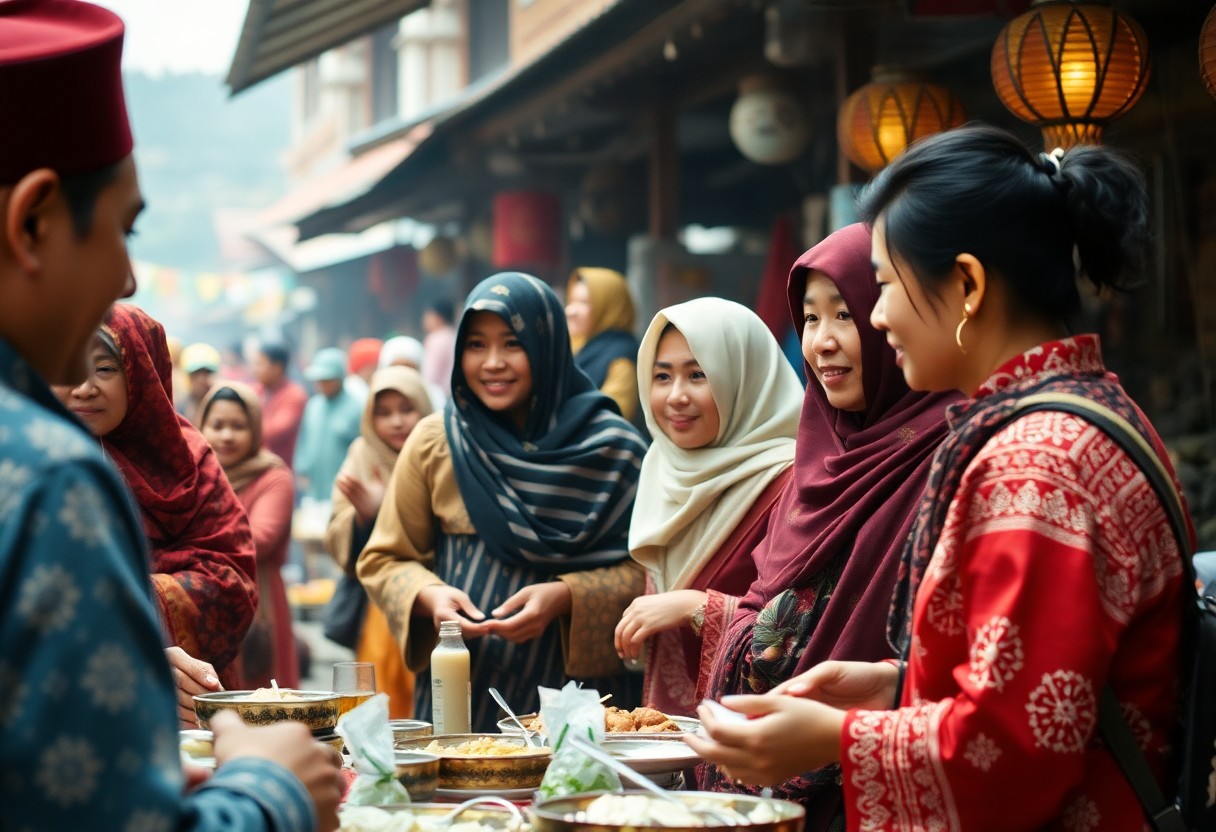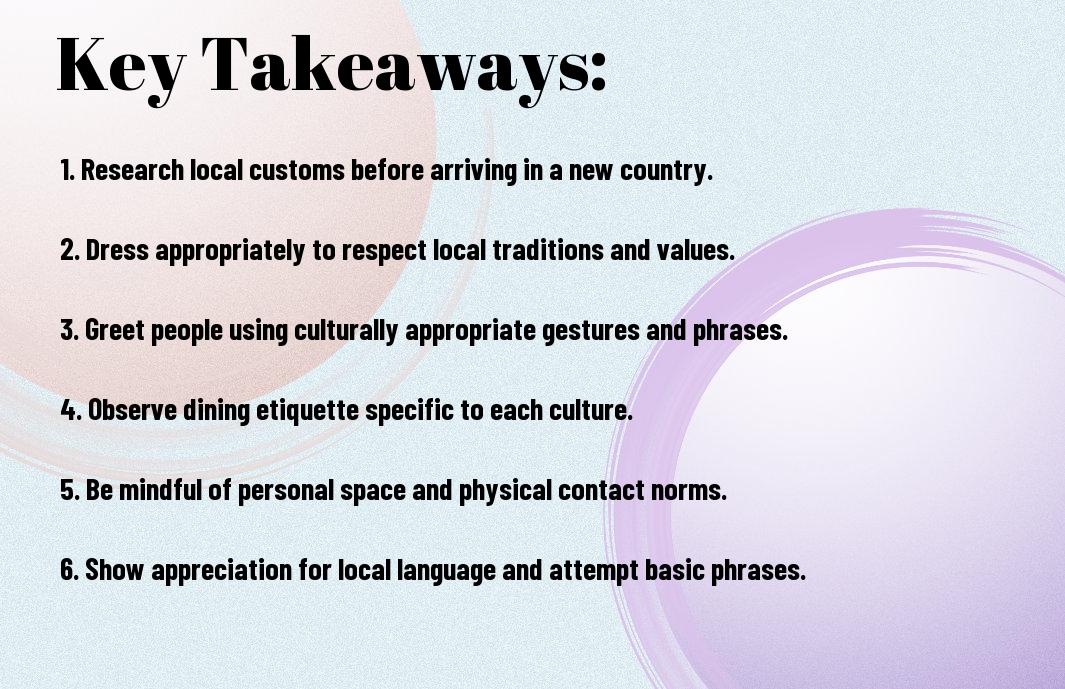It’s crucial to understand and respect the diverse customs and traditions you will encounter as you explore the globe. With every destination offering unique cultural nuances, being aware of etiquette can enhance your travel experience and foster meaningful connections with locals. In this list, you’ll discover ten pivotal tips that will help you navigate social situations while showing genuine respect for the various cultures you immerse yourself in, ensuring your journeys are as enriching as they are enjoyable.

Key Takeaways:
- Research local customs before traveling to understand cultural norms and expectations.
- Dress appropriately for the destination, as attire can vary greatly in different cultures.
- Respect personal space and customs surrounding physical touch, as these can differ greatly across cultures.
- Learn basic phrases in the local language; this shows respect and can enhance your interactions.
- Understand gift-giving etiquette to avoid offending hosts during visits or social events.

Greetings Matter
For global travelers, greetings serve as the first impression, setting the tone for your interactions. Different cultures have unique ways of saying hello, which can profoundly influence your experience. By showing genuine interest in local customs, you foster goodwill and connection, creating a more enriching journey.
Use Local Greetings
Clearly, using local greetings is imperative in establishing rapport with the people you meet. Simple phrases like “Bonjour” in France or “Konnichiwa” in Japan can convey respect and appreciation for the culture. Take a moment to learn a few basic greetings in the language of the country you’re visiting; it shows effort and humility, creating a warm atmosphere.
Respect Personal Space
Clearly, understanding the boundaries of personal space is vital to navigating different cultures. What may be comfortable for you might feel invasive to someone from another country. Pay attention to the body language of the people around you and adjust your proximity accordingly. In some cultures, keeping a respectful distance is a sign of politeness.
The concept of personal space varies greatly across cultures, so it’s important to be observant. In Western cultures, people often prefer at least an arm’s length of distance, while in some Mediterranean and Middle Eastern countries, closer contact can be more acceptable. Being attuned to these differences can help you avoid misunderstandings and create a more favorable environment for communication and connection.
Table Manners
The way you conduct yourself at the dining table can greatly impact your interaction with local cultures. It’s crucial to be aware of different customs and practices regarding table manners, as they often vary significantly from one country to another. Observing local etiquette can foster goodwill and make your dining experiences more enjoyable.
Eat with etiquette
You should always familiarize yourself with the local dining customs before sitting down for a meal. This includes understanding how to use utensils properly, which hand to eat with, and whether to keep your elbows off the table. Engaging in the local dining traditions shows respect for the host and enhances your travel experience.
Wait for host
With cultural nuances in dining, it’s important to wait for the host to begin the meal before you start eating. This not only shows respect but also allows you to observe any specific rituals they may follow, such as prayers or toasts. In some cultures, starting to eat before the host signals a lack of manners.
You can enhance your dining experience by observing this simple guideline. Waiting for your host to indicate meal commencement reflects your understanding of their traditions and emphasizes the value of hospitality. By aligning your actions with local practices, you not only display respect but also open the door for meaningful conversation and connection during the meal.
Dress Appropriately
To ensure a positive impression while traveling, be mindful of your attire. Different cultures have varying expectations regarding dress, often influenced by local customs, climate, and the setting you are in. When visiting religious sites or formal events, it is especially important to dress conservatively and respectfully to show your appreciation for local traditions. By doing so, you demonstrate a commitment to understanding and valuing the culture you are engaging with.
Follow local customs
With every destination comes unique dress codes that reflect the values of the culture. To blend in seamlessly, take the time to research and adapt to local customs, such as covering shoulders and knees in conservative areas. Understanding these expectations can enhance your experience and foster positive interactions with locals.
Avoid offensive symbols
An important aspect of dressing appropriately is steering clear of symbols that may be deemed offensive or disrespectful in certain cultures. This includes clothing featuring controversial imagery, slogans, or designs that could provoke negative reactions. Being cautious about your clothing choices not only protects you but also showcases your sensitivity towards the beliefs and values of others.
Appropriately navigating the landscape of cultural symbols can significantly enrich your travel experience. Take the time to learn which symbols are revered and which are considered taboo in the cultures you are visiting. This awareness will not only help you avoid potential misunderstandings but will also allow you to show greater respect for the traditions that shape the local identity.
Gift Giving
All cultures have unique customs when it comes to gift giving, and being aware of these traditions can enhance your travels. In some countries, gifts are expected in certain situations, while in others, they may be reserved for special occasions. Understanding the local etiquette surrounding gift giving can help you build strong relationships and show respect to your hosts.
Know Cultural Significance
Significance varies widely across cultures, and understanding these nuances can deepen your experiences abroad. For instance, in Japan, the number four is associated with death, so avoid giving gifts in sets of four. Similarly, certain colors may carry different meanings; red is auspicious in Chinese culture, while white may symbolize mourning. Familiarize yourself with these cultural details to ensure your gift is well-received.
Present Gifts Properly
One vital aspect of gift giving is the presentation. In many cultures, the way you give a gift matters as much as the gift itself. For example, in Arab cultures, it is customary to present gifts with the right hand only, as the left hand is considered less clean. Furthermore, ensure your gift is beautifully wrapped; ornate packaging shows that you put thought and effort into the gift.
Plus, when presenting a gift, take the time to offer it with both hands for added respect in numerous Asian and African cultures. A sincere smile and a few words expressing your gratitude or best wishes can make the moment even more special. Be aware of your surroundings, as some cultures may prefer gifts to be opened in private, while others enjoy the custom of opening gifts in front of the giver. Tailoring your approach to local customs can lead to meaningful exchanges during your travels.
Photography Protocols
Many travelers are eager to capture the beauty and vibrancy of the cultures they encounter. However, understanding local photography protocols can make a significant difference in ensuring respectful interactions. Different cultures have varying perspectives on photography, so it’s imperative to familiarize yourself with these customs to avoid any missteps. Know when and where it’s appropriate to snap a photo to enhance your travel experience.
Ask before taking pictures
Little moments can turn into beautiful memories, but always seek permission before taking photos of individuals. People may have personal reasons for wanting to keep their image private, or they might appreciate your courtesy and be delighted to pose. This small act of respect not only gets you permission but can also lead to more meaningful interactions with the locals.
Avoid sensitive locations
While capturing the essence of a place is important, sensitive locations require special consideration. Religious sites, memorials, and other significant areas often enforce strict photography rules to maintain tranquility and respect. Familiarizing yourself with these restrictions ensures that you engage appropriately and sensitively in different cultural contexts.
Locations such as temples, cemeteries, and private properties often have unwritten rules about photography. It’s wise to observe the behavior of others or seek guidance from locals to gauge if photography is acceptable. Sometimes, taking a moment to appreciate the surroundings without a camera can lead to a deeper understanding of the culture. Show your respect by being observant and mindful of the context—this will enhance your travel experience while ensuring you are a responsible traveler.
Body Language
Despite sharing a common language, body language can vary widely across cultures. Understanding these nonverbal cues is crucial for effective communication while traveling. Different gestures, facial expressions, and postures often convey different meanings in various countries. By being mindful of these differences, you can foster positive interactions and avoid miscommunications that could lead to unforeseen conflicts.
Research Meanings
Meanings behind gestures can differ significantly between cultures, making research crucial before your travels. For example, a thumbs-up is considered a positive nod in many Western nations but is offensive in some Middle Eastern countries. Engaging with cultural resources, guides, or language apps can help you grasp the local interpretations of body language and ensure respectful interactions.
Avoid Offensive Gestures
An understanding of local customs helps you avoid gestures that might be misinterpreted or deemed offensive. Each culture has its own set of social norms regarding body language, and what may seem innocuous to you could be offensive elsewhere.
To prevent unintentional faux pas, take the time to familiarize yourself with the cultural nuances of your destination. Simple actions, such as pointing with your palm facing down instead of up or avoiding direct eye contact in certain settings, can make a significant difference. Always approach interactions with curiosity and openness, and you’ll create a more respectful environment that fosters goodwill and connection.
Punctuality Expectations
After planning your travels, it’s important to understand the varying expectations around punctuality in different cultures. In some countries, being on time is a sign of respect, while in others, a more relaxed approach is taken. By familiarizing yourself with these norms, you can navigate social interactions with ease and demonstrate cultural sensitivity.
Be on time
Clearly, being punctual is often viewed as a positive trait. In cultures such as German and Swiss, timeliness reflects professionalism and values. Arriving late may lead to disappointment or give the impression that you’re uninterested. To make a good impression, ensure you plan accordingly and arrive at your destination on time.
Consider cultural norms
Any traveler should consider the cultural context when it comes to punctuality. In some regions, like Italy or Spain, a more relaxed attitude toward time is the norm, and being slightly late can actually be acceptable. Understanding these differences will help you build rapport with locals and feel more at ease in social situations.
Plus, embracing these cultural norms can enhance your travel experience. Engaging in local practices allows you to connect with people on a deeper level and lets you enjoy your journey to the fullest. By adapting your approach to punctuality based on your destination, you demonstrate respect for local traditions and help foster positive relationships with those you meet along the way.
Conversation Topics
Once again, navigating conversation topics while traveling can enhance your social interactions and create lasting connections. Being mindful of local customs helps you initiate meaningful dialogues and fosters goodwill. Engage in discussions that reflect local culture, such as cuisine, traditions, and festivals, to show your interest and respect. This approach not only enriches your experience but can lead to deeper insights into the community you’re visiting.
Avoid Taboo Subjects
Even in casual chats, certain topics can be sensitive or offensive, varying widely across cultures. It’s wise to avoid discussions about politics, religion, or personal finances, as these subjects can lead to discomfort or misunderstandings. Focus instead on light-hearted or neutral topics that everyone can appreciate, ensuring a pleasant interaction for all parties involved.
Engage in Local Interests
You should seek out topics that resonate with the local community and its interests. This includes local traditions, favorite sports, or popular hobbies. By showing genuine curiosity about these aspects, you not only enrich your travel experience but also create a rapport with locals, allowing for more authentic conversations. Ask questions about their local cuisine or events happening during your visit, which can lead to exciting exchanges and even invitations to participate.
Taboo subjects can often lead to misunderstandings and awkward encounters, making it imperative to approach conversations with sensitivity. Instead, make an effort to familiarize yourself with the region’s activities and interests, as this allows for smoother communication. By discussing widely embraced and positive experiences, such as local art, music, or landmarks, you create a welcoming environment. This openness can lead to invitations and shared experiences, enhancing your understanding and appreciation of the local culture.
Public Behavior
Now that you’re prepared for your travels, it’s crucial to understand the norms surrounding public behavior in your destination. Each culture has its own set of expectations regarding how to conduct yourself in public spaces. Being mindful of local sensitivities and practicing appropriate manners can enhance your experience and foster positive interactions with the locals.
Maintain Decorum
An crucial aspect of public behavior is maintaining decorum. This involves dressing appropriately for the location, using polite language, and managing your volume. Observing how others behave can provide you with valuable insights into the acceptable standards in that environment.
Respect Local Customs
Now, respecting local customs can significantly impact your travel experience. Engaging with the culture in a respectful manner helps you build connections and avoid misunderstandings.
For instance, in many Asian countries, it is common to remove your shoes before entering someone’s home, while in certain Middle Eastern cultures, it’s crucial to dress conservatively in public. Understanding these practices and adhering to them demonstrates your respect for the local culture and can open doors to richer interactions with the community, further enriching your travel experience.
Conclusion
As a reminder, navigating cultural etiquette is crucial to ensuring positive interactions during your travels. By being aware of local customs, respecting traditions, and adapting your behavior accordingly, you enhance not only your experience but also foster goodwill with those you meet. Your attentiveness to cultural nuances can lead to more meaningful connections and memorable experiences, making your journey more enriching. Embrace the diversity of the world and let your respect for different cultures guide you on your travels.
Q: What is the importance of understanding cultural etiquette when traveling?
A: Understanding cultural etiquette is significant for global travelers as it helps in building respectful relationships with locals. Knowing accepted customs and behaviors can enhance your travel experience by making interactions smoother and more enjoyable. It allows travelers to engage more deeply with the culture, fosters mutual respect, and can even lead to more meaningful exchanges. Additionally, being aware of etiquette can prevent misunderstandings or unintentional offenses that may arise from cultural differences.
Q: How does body language differ across cultures and why is it important?
A: Body language variations can be quite pronounced across different cultures. For instance, a gesture like a thumbs-up may be seen as positive in some countries but could be offensive in others. Understanding these differences is necessary as body language can convey messages even more powerfully than words. By being conscious of local body language conventions, travelers can better interpret social cues and avoid miscommunication. It enhances interactions by ensuring that non-verbal messages align with verbal communication.
Q: What are some common dining etiquette practices that travelers should be aware of?
A: Dining etiquette can vary dramatically from one culture to another. For example, in some Asian cultures, finishing all the food on your plate may signal that you were not given enough, while in others, it may be seen as polite. Additionally, the use of utensils varies, with some cultures using chopsticks, others relying solely on hands, and some preferring forks and knives. Being mindful of these practices can show respect for local traditions and enhance one’s dining experience. Observing locals and following their lead is often a good strategy when unfamiliar with a region’s dining customs.

